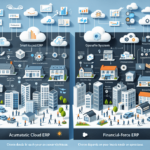Acumatica Cloud ERP vs NetSuite ERP: Comprehensive Comparison for 2024
The enterprise resource planning (ERP) landscape has evolved significantly, with numerous vendors offering robust solutions tailored to diverse business needs. Among the frontrunners are Acumatica Cloud ERP and NetSuite ERP, both renowned for their comprehensive cloud-based functionalities. This article provides an in-depth comparison of Acumatica Cloud ERP vs NetSuite ERP, incorporating the latest data and insights to assist businesses in making informed decisions.
Overview of Acumatica Cloud ERP and NetSuite ERP
Acumatica Cloud ERP and NetSuite ERP are leading cloud-based ERP solutions designed to streamline various business operations, including financial management, inventory control, project management, and more. Acumatica is celebrated for its flexibility, scalability, and user-friendly interface, making it suitable for small to mid-sized enterprises. In contrast, NetSuite, a part of Oracle, offers a more extensive feature set aimed at medium to large enterprises requiring advanced functionalities and industry-specific solutions.
Acumatica Cloud ERP
Acumatica stands out with its open architecture, enabling seamless integration with a multitude of third-party applications. This flexibility allows businesses to customize their ERP environment to meet specific operational needs without significant overhauls. Additionally, Acumatica offers a cloud-based platform with robust mobile accessibility, ensuring that users can manage their operations from anywhere.
NetSuite ERP
NetSuite ERP provides a comprehensive suite of applications that integrate financials, CRM, ecommerce, and more into a unified system. Its strong focus on scalability and advanced analytics makes it a preferred choice for growing businesses and large enterprises. NetSuite also offers industry-specific solutions, catering to sectors such as manufacturing, retail, and healthcare.
Key Features and Functionalities
Financial Management
Both Acumatica and NetSuite offer robust financial management tools, including general ledger, accounts payable and receivable, and financial reporting. NetSuite, however, provides more advanced financial features like multi-currency support and consolidated financials, which are particularly beneficial for global enterprises.
Project Management
Acumatica offers comprehensive project management capabilities, including project accounting, resource management, and time tracking. NetSuite's project management module is highly integrated with its financials, allowing for real-time tracking of project profitability and performance.
Inventory and Order Management
Both platforms excel in inventory and order management. Acumatica's open architecture allows for better customization of inventory workflows, whereas NetSuite offers more out-of-the-box features like advanced demand planning and supply chain management.
Reporting and Analytics
Advanced reporting and analytics are strengths of both ERP systems. NetSuite leverages Oracle's robust analytics tools, providing deep insights and predictive analysis. Acumatica, meanwhile, offers customizable dashboards and real-time reporting, empowered by its flexible integration capabilities.
Pricing Comparison
Pricing is a critical factor in ERP selection. Acumatica adopts a flexible pricing model based on the number of users and the specific modules required, starting at approximately $4,000 per year for a single user license. This model allows businesses to scale costs in line with their growth and specific needs.
In contrast, NetSuite's pricing begins at around $999 per month for the base license, with additional costs for each user and module. While NetSuite's initial pricing may appear higher, it includes a comprehensive suite of features that may reduce the need for additional third-party integrations.
According to a Forrester report, businesses often find that the total cost of ownership (TCO) for NetSuite can be justified by its extensive capabilities and scalability, especially for larger organizations.
Customization and Integration
Customization and integration capabilities significantly impact an ERP's adaptability to unique business processes.
Acumatica Cloud ERP
Acumatica's open architecture allows for extensive customization without extensive coding. Its platform supports integration with various CRM systems, ecommerce platforms, and other business applications through APIs and built-in connectors. This flexibility enables businesses to tailor the ERP to their specific workflows and operational requirements.
NetSuite ERP
NetSuite offers robust integration options through its SuiteCloud platform, which allows developers to create custom applications and integrations. While NetSuite provides numerous built-in integrations, its customization process can be more rigid compared to Acumatica, potentially requiring businesses to adapt their processes to fit the software.
For businesses seeking high levels of customization with minimal disruption to existing workflows, Acumatica may offer more advantages. However, NetSuite's comprehensive integration capabilities can be beneficial for organizations looking for a unified ecosystem with less need for extensive customization.
Scalability and Implementation
Scalability and implementation timeframes are crucial considerations for growing businesses.
Acumatica Cloud ERP
Acumatica is highly scalable, allowing businesses to add new modules and users as they grow. Its implementation process is typically faster, often completed within a few weeks, thanks to its flexible pricing and customization options. Acumatica's cloud-native architecture facilitates easy upgrades and scalability without significant disruptions.
NetSuite ERP
NetSuite is designed to support large-scale operations and can handle extensive datasets and complex transaction volumes. However, its implementation process can be lengthy, often taking several months, due to the comprehensive nature of its features and the complexity of customization required for larger enterprises.
A study by Software Advice indicates that while NetSuite offers powerful scalability, businesses should anticipate longer implementation timelines compared to more flexible solutions like Acumatica.
User Interface and Security
User Interface
User experience is a significant factor in ERP adoption and efficiency. Acumatica boasts a modern, intuitive interface that enhances user adoption and reduces training time. Its dashboard is customizable, allowing users to tailor their view to display relevant information and metrics.
NetSuite also offers a user-friendly interface, with customizable dashboards and navigational tools. However, some users find NetSuite's interface more complex due to its extensive feature set, which can lead to a steeper learning curve.
Security Features
Both Acumatica and NetSuite prioritize security, offering features such as two-factor authentication, role-based access control, and audit trails. They are compliant with industry standards like SOC 2, ensuring robust data protection and compliance.
NetSuite leverages Oracle's security infrastructure, providing additional layers of protection and advanced security features suitable for enterprises with stringent security requirements. Acumatica, while also secure, offers flexibility in configuring security settings to match specific business needs.
Customer Support and Implementation
Customer Support
Effective customer support is essential for successful ERP implementation and ongoing operations. Acumatica is known for its responsive support team and extensive online resources, including a community forum, knowledge base, and on-demand training materials.
NetSuite provides comprehensive support through various channels, including phone, email, and an online support portal. However, some users have reported longer wait times and variable support experiences, particularly during initial implementation phases.
Implementation Services
Acumatica offers streamlined implementation services with a focus on quick onboarding and minimal disruption. Its flexible architecture allows for tailored implementations that align closely with business processes.
NetSuite's implementation often involves partnering with certified implementation consultants to navigate its extensive features and customize the system to enterprise needs. This thorough approach, while time-consuming, ensures that the ERP system is fully aligned with complex business requirements.
Pros and Cons of Acumatica Cloud ERP vs NetSuite ERP
Acumatica Cloud ERP
- Pros:
- Flexible and scalable pricing model
- Highly customizable and open architecture
- User-friendly and intuitive interface
- Robust mobile accessibility
- Cons:
- Fewer out-of-the-box industry-specific features
- Less extensive integration options compared to larger ERP providers
NetSuite ERP
- Pros:
- Comprehensive and extensive feature set
- Advanced financial management and analytics
- Strong integration capabilities with third-party applications
- Scalable to support large enterprises
- Cons:
- Higher initial and ongoing costs
- Steeper learning curve due to complex interface
- Longer implementation timelines
Best Use Cases: When to Choose NetSuite over Acumatica (and Vice Versa)
Choosing between Acumatica Cloud ERP and NetSuite ERP depends on various factors, including business size, complexity, budget, and specific operational needs.
Choose Acumatica Cloud ERP If You:
- Are a small to mid-sized business seeking flexibility and scalability
- Require extensive customization to match unique workflows
- Have a limited budget and prefer a pay-as-you-go pricing model
- Need robust mobile access for remote or field-based teams
Choose NetSuite ERP If You:
- Are a medium to large enterprise with complex operational requirements
- Need advanced financial management and comprehensive analytics
- Require industry-specific solutions and extensive integration capabilities
- Plan for significant growth and need a highly scalable solution
Future Outlook: What’s Next for Acumatica Cloud ERP and NetSuite ERP?
The ERP market continues to evolve, driven by advancements in artificial intelligence, machine learning, and automation. Both Acumatica and NetSuite are poised to integrate these technologies to enhance their platforms further.
Acumatica is likely to focus on enhancing its AI-driven analytics and automation features, providing businesses with deeper insights and streamlined operations. The recent acquisition by EQT is expected to fuel Acumatica's growth and innovation, allowing for increased investments in research and development.
NetSuite, under Oracle's umbrella, will continue to leverage Oracle's extensive resources to enhance its ERP solutions. Future developments may include more integrated AI functionalities, expanded industry-specific modules, and improved user experience through advanced UI enhancements.
Final Thoughts: Which ERP Solution is Best for Your Business?
Deciding between Acumatica Cloud ERP and NetSuite ERP requires a thorough analysis of your business's specific needs, budget, and growth plans. Acumatica offers flexibility, customization, and a user-friendly interface ideal for small to mid-sized businesses with unique operational requirements. On the other hand, NetSuite delivers a comprehensive feature set, advanced financial management, and scalability suitable for medium to large enterprises seeking robust, all-in-one ERP solutions.
It is essential to conduct a detailed assessment of your business processes, consult with stakeholders, and possibly engage in trial implementations to determine which ERP system aligns best with your strategic objectives. Leveraging user reviews, expert consultations, and up-to-date industry reports can also provide valuable insights to inform your decision.
Ultimately, both Acumatica Cloud ERP and NetSuite ERP are powerful platforms capable of transforming business operations. The right choice will empower your organization to enhance efficiency, drive growth, and maintain a competitive edge in the dynamic market landscape.




















